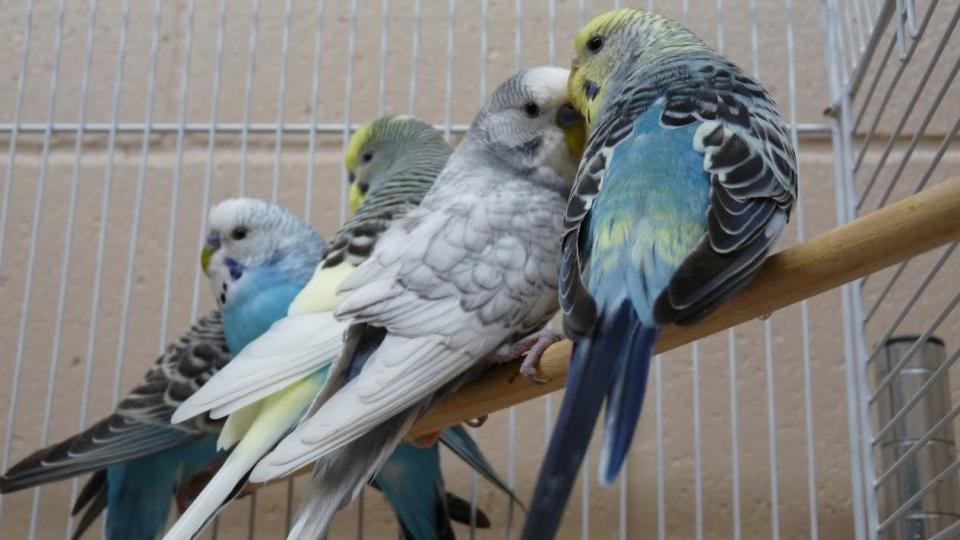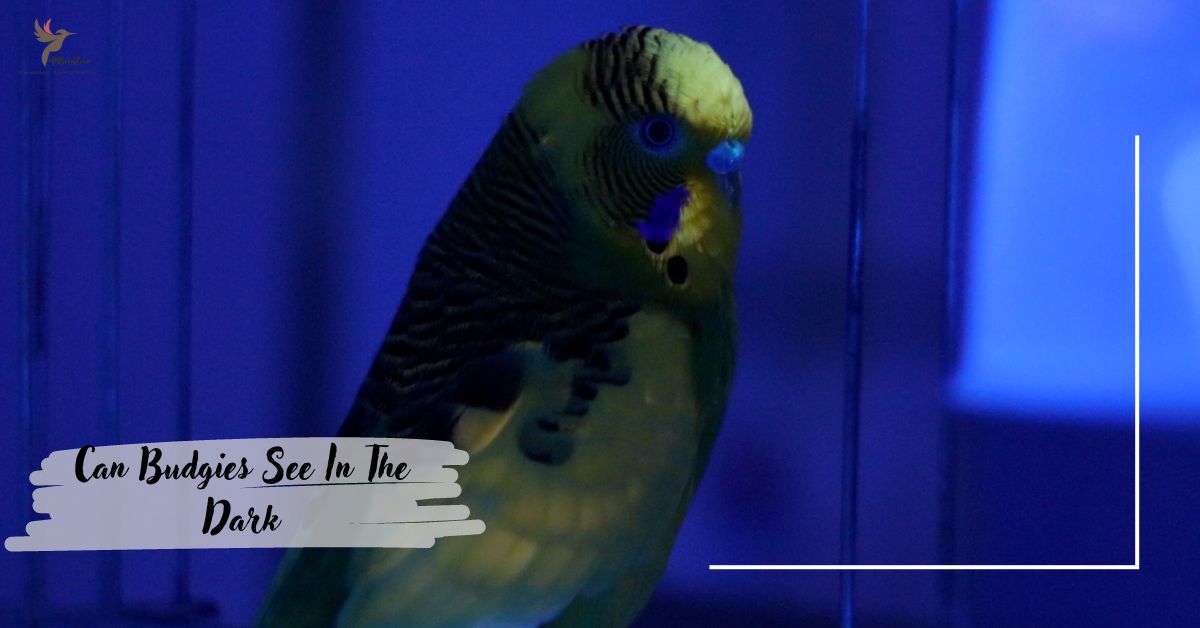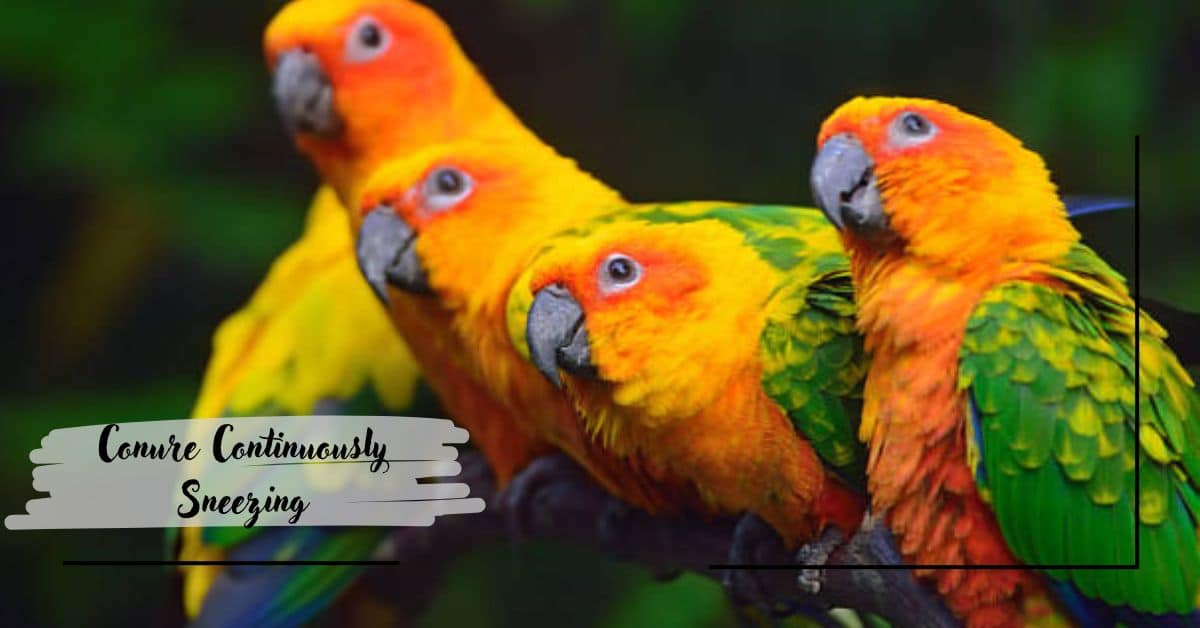Can Budgies See In The Dark, Budgies also known as budgerigars or parakeets, Budgies are not nocturnal creatures, so their vision is not adapted to complete darkness. They are better suited to seeing in low-light conditions rather than total darkness. In the wild, budgies are active during dawn and dusk, which means they have evolved to see well during these times. However, when it’s completely dark, their vision is not much better than that of humans. To keep your budgie comfortable, it’s important to ensure they have a consistent light cycle in their living space. This means providing a regular day/night cycle to mimic their natural environment.
How Good Is a Budgie’s Eyesight?
Budgies have remarkably sharp vision, which is crucial for their survival in the wild. They possess a high number of photoreceptors in their eyes, which allows them to see a broad spectrum of colors and detect fine details. Here are some key aspects of their eyesight:
Color Vision:
Budgies can see a range of colors, including ultraviolet light, which is invisible to humans. This helps them identify different foods and spot mates or predators.
Movement Detection:
Their eyes are sensitive to motion, which helps them detect predators and navigate their environment quickly.
Visual Acuity:
Budgies have excellent visual acuity, allowing them to see small objects and changes in their surroundings clearly.
Are Budgies Afraid Of The Dark?
Budgies can get scared of the dark if they’re not used to it. They’re used to light changing slowly and might feel uneasy if it suddenly goes off. This fear comes from their instinct to be cautious of darkness, which could mean danger in the wild. Without light, they can’t see well and might get confused. Also, if they’re used to a regular lighting routine, sudden changes can make them feel unsettled.
Why Budgies Might Fear the Dark?
Budgies might fear the dark for several reasons. Instinctively, darkness can signal danger or predators, triggering a natural fear response. They also feel more secure when they can see their surroundings, so complete darkness can make them feel vulnerable and unsure. Additionally, if they are not accustomed to the dark, it can create a sense of unease and fear.
How to Stop Your Budgie from Being Afraid of the Dark?
1. Gradual Light Reduction:
Instead of turning off the lights suddenly, dim them gradually to help your budgie adjust to the change in lighting.
2. Use a Night Light:
Place a soft, dim night light in or near their cage. This provides a gentle light source without disrupting their sleep.
3. Maintain a Routine:
Establish and stick to a consistent lighting schedule. This helps your budgie get used to the transitions between light and dark.
4. Create a Safe Space:
Make sure their sleeping area is cozy and secure. Familiar objects and a comfortable perch can help reduce anxiety.

How to Calm a Scared Budgie? – Try These Method!
- Speak Calmly: Use a soothing voice to communicate with your budgie. Your calm demeanor can help reassure them.
- Avoid Sudden Movements: Quick or unexpected movements can startle your budgie. Approach them slowly and gently.
- Provide Comfort Items: Place their favorite toys or a soft cover over their cage to create a sense of security.
- Spend Quality Time: Interact with your budgie regularly to build trust and reduce their fear. Positive social interaction can help them feel more at ease.
How Do Budgies See Humans?
Budgies are quite skilled at recognizing and interacting with humans. They have sharp eyesight that allows them to identify their owners and tell them apart from other people. For example, they might get excited or show affection when they see their favorite person. Budgies also observe changes in facial expressions and body language, helping them pick up on their owner’s emotions. If their owner looks happy, the budgie might respond with cheerful chirps, while a sad face might make them more subdued. Through regular interaction, such as talking to them or spending time with them, budgies can build strong relationships with their caregivers. They may greet their owners with happy noises or friendly behavior, showing that they recognize and enjoy their company.
How to Maintain Your Budgies’ Eye Health? – Essential Tips!
Regular Cleaning:
Ensure their cage and play area are clean to prevent infections or irritants that could affect their eyes.
Balanced Diet:
Feed your budgie a diet rich in vitamins and minerals. Foods like carrots and leafy greens provide essential nutrients for eye health.
Monitor for Issues:
Keep an eye out for signs of eye problems such as squinting, discharge, or swelling. If you notice any issues, consult a veterinarian promptly.
Safe Environment:
Make sure their cage is free from sharp objects or anything that could potentially injure their eyes.
Common Asked Queries About Budgies Vision:
Is it okay to leave budgies in the dark?
Budgies should not be left in complete darkness. They are accustomed to gradual transitions between light and dark, as in their natural habitats. Sudden darkness can make them feel insecure and anxious. It’s best to provide a consistent light/dark cycle to keep them comfortable.
Do budgies need light at night?
Budgies generally need some light at night to feel secure. A soft night light can help them feel more at ease without disrupting their sleep cycle. Complete darkness might cause them stress, especially if they are not used to it.
Do budgie birds like the dark?
Budgies do not necessarily “like” or “dislike” the dark, but they are more comfortable with gradual changes in light. They are used to natural light cycles and may feel uneasy if they are abruptly placed in complete darkness.
Can budgies see at night when the light is on?
Budgies can see better in low light conditions rather than complete darkness. If a light is on, even dimly, they can see and navigate their environment more comfortably. The light helps them feel secure and aware of their surroundings.
Can parrots see in the dark?
Similar to budgies, parrots do not have good night vision. They can see better in low light conditions rather than in complete darkness. They rely on light to navigate and feel secure, and they may become anxious in total darkness.
Do Budgies Prefer Being Covered in the Dark?
Budgies may feel more secure if covered in the dark with a soft cover or cloth over their cage. This creates a cozy and private environment that mimics their natural sleeping conditions, helping them to feel safe and relaxed.
Do Budgies Require Darkness to Sleep?
Budgies require a consistent light/dark cycle to regulate their sleep patterns. While they do not need complete darkness, a period of low light or dimness at night helps them to sleep better. Maintaining a regular routine with gradual transitions between light and dark is beneficial for their well-being.
Can Budgies Develop Vision Problems?
Yes, budgies can develop vision problems if their eye health is not properly maintained. Common issues include infections, cataracts, or injuries. Regular check-ups, a balanced diet, and a clean living environment are essential for preventing vision problems and ensuring their overall health.
How Can I Tell If My Budgie Has Eye Problems?
Signs that your budgie might have eye problems include squinting, redness, discharge, or any abnormal behavior such as difficulty perching or flying. If you notice any of these symptoms, it’s important to consult a veterinarian for a thorough examination and appropriate treatment.
Can Budgies Adapt to Changes in Lighting?
Budgies can adapt to gradual changes in lighting, but sudden shifts can be stressful. It’s important to make any changes to their lighting conditions gradually to help them adjust without causing anxiety or confusion.
In A Nutshell:
Budgies do best with a regular light and dark cycle. They don’t see well in total darkness, so a little bit of light at night can make them feel safe. Keeping their environment steady and their eyes healthy will help them stay happy and comfortable.







